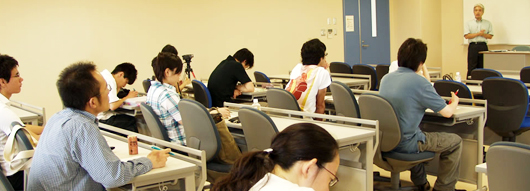



General Outline
The objective of the Global Governance Program is to foster talented individuals with specialized knowledge in such fields as international relations, history of international relations, and international law, and to train individuals that will play active roles in the government, international organizations and NGOs, based on an educational program that concentrates on international relations. There is an increase in the sectors engaged in activities beyond national borders, and a dynamism has appeared in international politics to form a new order or cause conflicts. On the one hand, a horizontal connection in the form of a global civil society has advanced, while, on the other, a dark dynamism that brought about
conflicts such as the 9.11 terrorist attack has developed; therefore, it is necessary to foster people, with new ideas, who could respond to such changes and become actively involved in conflict resolution, international security, human security and international regional
cooperation. The Global Governance Program aims to foster true globalists that can play active roles in this changing world.
Foreign Service Sub-program (FSS)
General Outline of the Curriculum
【Courses】
One of the unique characters of the Global Governance Program is that many of the classes are conducted in English. While some might object to the education provided extensively in English, there is no doubt that a good command of English is necessary to become individuals who can play proactive roles in the world.
The courses are divided into 4 categories, including, "Basic Courses," "Core Courses," "Applied Courses," and "Case Studies/Workshops," which are the same as other programs at School of International and Public Policy. The courses in the different categories will be explained in more detail in the following.
<Basic Courses>
First, the "Basic Courses" are provided so that students can learn the basics of international relations. The objective of these courses is for students to learn about the complex situation of the world and acquire basic knowledge through the theories of international relations, historical trends in international relations, and the role of international law and legal norms. Another aim is to provide classes in which students can think about general global issues. Through the Basic Courses, students will be able to obtain a clearer image about the current situation of international politics and international relations.
<Core Courses>
After obtaining a clear image of the current international relations and international politics in the basic courses, students are then asked to obtain knowledge and the method to think about more specialized issues. The "Core Courses" have been established for this purpose. In order to propose policies for global governance, the knowledge obtained through the basic courses and the reinforcement of specialized knowledge will certainly be an extremely powerful tool for policy proposal and policy analysis.
<Applied Courses>
After studying the "Core Courses," students will be taught specialized knowledge that directly links to policy proposal and how to use this skill. To do so, it is necessary to know what kind of problems exist in international relations, what kind of policies can be established, and the effects of such policies. Students will know how to apply the knowledge that they have learnt, and will become familiar with the more complex aspects of current issues in international relations.
<Case Studies and Workshops>
Most of the courses mentioned above help students obtain knowledge and the thinking process of how to use such knowledge. In order to become a professional in international public policy making for global governance, it is necessary to train students to find answers to international issues by themselves, as if they were the actual parties concerned through the past and present case studies. Moreover, students will need to be able to explain their policy proposals to others, and convince them of the effectiveness of policy prescriptions in the proposals and their feasibility. Therefore, faculty members including practitioners have established some omnibus-type courses of "Case Studies" and "Workshops."
Faculty Members

